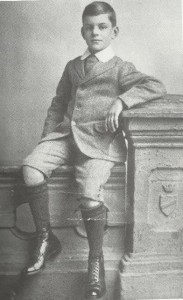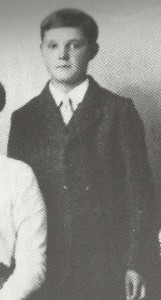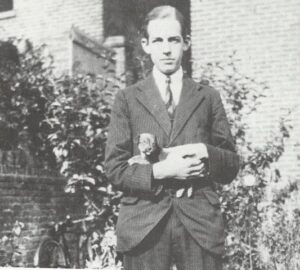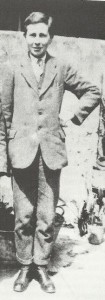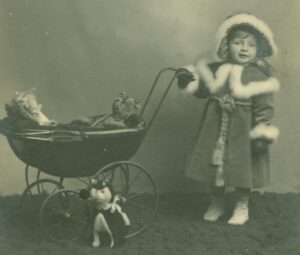In the late 1980s Fred Gray and Aylwin Guilmant worked with Bexhill Museum on an oral history project called “Bexhill Voices” which set out to record the personal stories of local residents who grew up in Bexhill. The first volume focussed on people who were born before or during the First World War.
These accounts provide a wonderful insight into the childhood memories of Bexhill during the First World War. These childhood (and teenage) recollections have been reproduced from the book “Bexhill Voices”.
The town was very busy in summer. We always had a military band which used to play at the bandstand at the Colonnade before the war. We lads used to sit on that piece facing the sea you know, because it was always crowded, hundreds of people. I remember in 1914 when war was declared the band was playing. When they got the news they immediately packed up and went out of the town.
Of course, then all horses were confiscated. When they were getting ready from the Drill Hall they were all staked along the Down on long running ropes. The owner’s wife at Sabin’s, they confiscated her own personal horse, but instead of letting it go she had it done away with, she would not let it go for war.
In the 1914-18 War, Cornelius the coach-builder’s son, Eric, he started selling papers in Cooden Camp. The camp was where Cooden Mount was in those days, which of course is now all built on. I have no idea what I got paid for doing the paper round. At that time I had just learned to ride a bike. So Eric said “would you like to come out to Cooden Camp with me – you get a dammed good breakfast.” So I said I wouldn’t mind. So we used to cycle out there and go our separate ways in the huts. By the time I had finished I had a breakfast in the privates’ quarters and I had also had another breakfast in the sergeants’ quarters. They were the Canadians.
The South Africans were there at one time. They had that bear that they took with them everywhere they went. A great thing! I have been near it, but not too near! It was always chained up in the sort of Guard-room at the entrance to the camp.
At the bottom of Clavering Walk there used to be a club. They took that over and that was a VAD [Voluntary Aid Detachment] place. I used to take papers in there, and go through the wards, and sell papers.
During the First World War you used to queue for butter, margarine and that sort of thing. I remember once in Cornwall Road when the Zeppelin came over, coming out of England and out across the channel it was so low you could see the blokes standing in there! We were too interested to be afraid. We stood there, gawping at the thing. It was a terrific great long thing. There were no anti-aircraft guns in the town like the Second War. Apart from the restrictions and the loads of soldiers in the town, it was quite ordinary. You would go about in the ordinary way, there were no air raids or things like that. You could hear the guns from France – a rumble you know.
ALICE ELDRIDGE
When the war came it was marvellous and because soldiers and all that came, Canadians and Americans and all and we used to walk to Catsfield with them and come to no harm. We used to walk to the Gaiety Theatre [Hastings] and queue up and walk back – sit on the seat coming through what we called The Salts between St Leonards and Bexhill, the waste bit, with the farm, cows and that on there now. And no trouble with any of them. Sex never was mentioned.
Talking about her husband:
“He was the boy who used to come round with the greengroceries in Bexhill. He worked for Giggins, the greengrocer, used to be on the corner of St. Leonards Road. He enlisted into the army then, he was in the Queen’s Wets Surrey’s and he got shell shocked and one leg shorter than the other, because he fell into a shell hole. Wasn’t that they called injured though one leg was half an inch shorter for the rest of his life. He also served in the Home Guard in the Second World War”.
Her wartime sweetheart;
“I didn’t get married till I was 27 because my real sweetheart was missing in the war and I always thought he would come back. Reg was a signaller in Lowthers Lambs and he was reported missing. He was last seen on enemy land which he had courageously reached and I couldn’t think he would never come back. He was such a darling. He lived in Sidley. They had two sons, the other died of spotted fever and was buried at Harwich.”
OLIVE WRIGHT
In the First World War we had some Canadians come over to Bexhill. They were billeted in private houses down Sea Road and places like that. We weren’t allowed to associate with them. I didn’t have any boyfriends till my husband came along. I met my husband in 1915 in the Baptist church. He was a soldier based by the golf course and he went to look round the town with a friend. He walked down Buckhurst Road and came across the Beulah Baptist church. They tossed up whether to go in and they saw two young ladies sitting on the bench. And he said to his comrade, “That is the girl I’m going to marry.” We had never seen or spoken to each other then. Then my sister and I came out of the church. He had been talking to another girl in the church and asked who I was. She had said that I was engaged to be married. So he came up to me and said, “Little missy, you engaged?” I looked at him and said, “No I’m not! I’m only 15”, and I walked down the road with him and he said to me, “Will you see me on Wednesday?” I said “yes, I suppose I can. I’ll have to tell my mother.” (Because she was very particular what I did.) Mother said she supposed there wouldn’t be any harm to see him.
So I met him on the front where the Colonnade is. He said to me, “I wanted to see you ‘cause I’m going to France and I wondered if you would write to me.” So it was all done by writing. Then, after we had been writing for a long time, he said “would you be my girlfriend?” I supposed it would be alright because I might never see him again.
He was badly gassed. I had this thing come through the post – “I have been gassed”. I didn’t know but he was given up almost for dead. But he got my letter which said I would be his girlfriend and they said he went to sleep that night for the first time since he had been gassed. The nurse noticed a change in him and told the doctor about the letter. I don’t know, it gave him fresh hope I suppose. He kept that letter with him always. He was sent to York to recover.
I hadn’t heard much from him while he was away then one Sunday night I came out of church and he was standing outside and said he would be stationed near Brighton and he would be able to see me weekends. He used to stay with my grandma. He was in an office then and he said, “I’m going to India and I’ll be there for perhaps six or seven years. Do you think we could get married?” I said I would marry him and he must see my father. Then I had letters from the army to say I must be inoculated. I had to go to London and then Southampton and got a big boat and I can remember standing on the deck watching England go away and thinking. “I wonder if I’ll ever see old England again.” I sent a postcard to mother to say I was sailing.
My vivid recollection was always in the early days of the First World War, you see, Belgium got over run didn’t it? And we took in a terrific lot of Belgian refugees all round the town that had to come away from the war zone and they were, every morning, waiting for their plates outside the railings of the school playground – getting food from the troops. We had to pass the school that we were due to go to and the troops had it. They fed all their bits and pieces to the Belgian refugees who used to line the railings of the playground.
It was during the First World War that we used to have a woman lodging with us. We found room, cause we had to use the front room for a bedroom for us lads you see. I know we only had the two rooms but I think Mrs Cornford the woman upstairs let my mother have one of her bedrooms. She [the lodger] was chummy with the quartermaster-sergeant from the Cooden camp – he had charge of all the stores – QMS Lyons his name was. It was him that got me these boxing gloves. He got them in from the camp. I used to go to Cooden and watch some of their boxing shows and they knew I was keen.
We used to go across the road to 105 opposite and make use of the gloves in the loft we cleared for us over there. Old Ashdown, old bearded boy, down in the yard had it. We rented it from him. Candles set fire to the cobwebs. We used to pick the football team. We had friendly games against Service Invalids. There used to be a voluntary aided hospital at Cooden you see, and the troops used to come down. We could only get friendly games around the district. There was no organised football league during the war. Of course at the back of us, the stable yard, was the Empire Laundry. Old Mary Stampton, she also ran a football team and used to give us a game. We played over in Cranston Avenue.
We went to Cooden by tram. Only a tram track. Overhead wire, terrible bit of road. Soldiers were camped up top of the hill of Cooden Sea Road, on the mound, the Mount was an old property which has been developed. Lowther’s Lambs, the South Downs formed two battalions. Colonel Lowther was a big noise.
While we were there up in the loft the troops came in and claimed four out of his [Ashdown’s] six horses and commandeered them. That was the only transport the troops had when they first established out at Cooden. Ashdown used the horses for heavy contracting work instead of trucks and vans and lorries, just horses and carts.
During the 1914 War the Canadians were billeted in Bexhill and one winter the boating pool in the Park was thickly iced over up to the island at the Wickham Avenue end. Everyone who could went there to ice skate and of course the Canadians relished the idea of skating. It’s the only time I remember Egerton Park lake been frozen over to the extent it was then. I had new skates but ricked my ankle the first time I tried them out.
There was a firing range on South Cliff about opposite Southcourt Avenue. The Canadians used the cliff embankment as background for target practice and fired from the west end. My brother Jack and I collected lead bullets, perhaps they were revolver bullets, I’m not sure, and melted them down in a pan over the fire in our bedroom when we had chicken-pox. That was when we lived at Clifford Road. I don’t remember my parents been cross with us or worried, everything was quite regulated and I’m surprised Father and Mother didn’t object.
During the First World War some cars used gas instead of petrol and could fill large bags on the roof of their vehicle. They got their gas from the gasworks at the corner of De La Warr Road and also from the Marina Garage at the bottom of Eversley Road.
HARRY HALLS
I haven’t taken sugar in my tea since the 1914 war. We used to go blackberrying and then to try and make a bit of jam, and we had to save our sugar; we couldn’t afford it in tea. We used to have Newbury’s jam from Battle in our shop. All these big firms in those days had travellers; we used to get travellers come round. We sold grocery and provisions; practically everything, from a pin to an elephant. We had a double-counter shop. That was a lovely shop [in Windsor Road].
DAISY SPANDLEY
I was five when the First World War broke out. It was nothing like the second, no bombing, apart from having the Canadian soldiers here. The soldiers came to the nursery sometimes, for a bit of salad. If they had a girlfriend they’d come for a bunch of flowers. That sort of thing. They were friendly, over friendly some of them, if you know what I mean.
IVY FULLER
My father came to Bexhill in 1913. He had a grocer’s shop in Sidley Street and then the 1914 war broke out. And I can remember my father going off one morning on his bicycle wearing a Norfolk jacket. It had a pocket at the top and he filled that top pocket with golden sovereigns to go off to the wholesalers, which was at St Leonards, Stuart’s the grocer’s wholesalers, to buy up food, as much as he could, to stock the shop because he wondered what the war was going to bring.
Then during those years the men were called up into the forces. We had friends at Little Common, grocers also, by the name of Elliott, and the sons went. Mr Elliott was an invalid and he managed, sort of, the shop from upstairs. But his sons were called up and of course the staff was difficult to get. So my parents and myself as a small girl, on his bicycle, we went over to Little Common to help weigh up the stock for the shop so that the people in the shop could serve. They used to do that after our own shop was closed at night. The Elliott’s shop then was more or less up the Twitten at Little Common. Were now at the moment there is a hairdresser’s there.
BERT KIFF
My mother was a Catsfield girl, Naomi Stubblefield, and my father was a Chief Petty Officer, Royal Navy. They were married at Catsfield Church on Christmas Day 1910 and moved to Newington, which was between my father’s base at Chatham and Sheerness. We lost dad on New Years Day 1915, when HMS Formidable was lost. My mother found work in the orchards to help supplement her pension and in October 1915 we moved to our grandparents in Silvester Road, Bexhill.
For a few months I knew Bexhill Old Town as our local shops. Starting with the Beehive Sweetshop, then Pocock’s the Butcher, the Post Office, Waite and Whybourne Dairy, and Cave Austin the Blacksmith with the Old Walnut Tree in the Centre of the road. Dr Kent was in Dorset House.
When the First World War started I was five. I went to school soon after the war began. There was a lot of sadness there because one of the tradesmen opposite had a working horse, and the military just came along and commandeered the horse. As a boy I had some pretty good idea that horses were being killed in their thousands in the fields of Flanders, and I can remember now the hush in that shop, never shall I forget it. The Canadians were stationed here. That was just up my street! They used to get into what they called squads in Sackville Road and there’d be a squad drilling and then they would sing “Oh my! What a rotten singer too!” and you’d hear that. One day at the junction of Wickham Avenue and Woodville Road, I’d been watching them and I could do their drills too, and they started showering me with pennies. I didn’t mind at all! I must’ve gone home feeling good.
I remember my mother having the ration of margarine. You used to get it from the Maypole in Devonshire Road. It wasn’t enough, so she bought some other ingredients to mix with it.
During the First World War a large area of land, now the South Cliff and north of that area, was occupied by troops as a training area. Live ammunition was used, and after the war one or two boys, perhaps more, handled live grenades and suffered injury.
I was born 13th January 1911 in St Leonards Road next door to Hampdens. We had a baker’s and confectioner’s business there when I was born. It is now the estate agents. Unfortunately, I was the only child. I did have my cousins Doris and Sid. My father and his brother were partners. My grandfather started the business. Father was born in one of those little row of cottages, little two-storied houses, all joined along Ninfield Road.
Their father was unfortunately killed in the First War, so father became their guardian. When aunty was ill she was looking after the Windsor Road shop and she wasn’t strong enough to continue. So we went to Windsor Road and mother looked after that shop. It’s now the vets and the chiropodist. Of course the bakery is still there behind, but that is now Barnes and Watsons, printers.
We always had horses right up to the Second World War and then we gave them up because one of them bolted. The horses were called up in World War One. I think it broke my father’s heart because they came round and took the horses. They had a pool for the bakers, they sort of pooled their facilities, you see each one helped the other. Rations were short and Mr Thompson was called up. Well my father had polio when he was quite young and he was slightly shorter in one leg than the other so he was left behind. We made the bread and Mr Thompson’s sister-in-law, she was a great character, she looked more like a man than a woman, she used to do the confectionery over in their bakery – the little bit you could do in those days. When Mr Thompson came back they decided we would amalgamate and carry on.
In the First World War I can remember my cousin and I being right at the top of my aunt’s house to look at a German plane. My parents were horrified afterwards. That was in Sackville Road. My uncle had a bicycle business there and they used to hire out Bath chairs.


